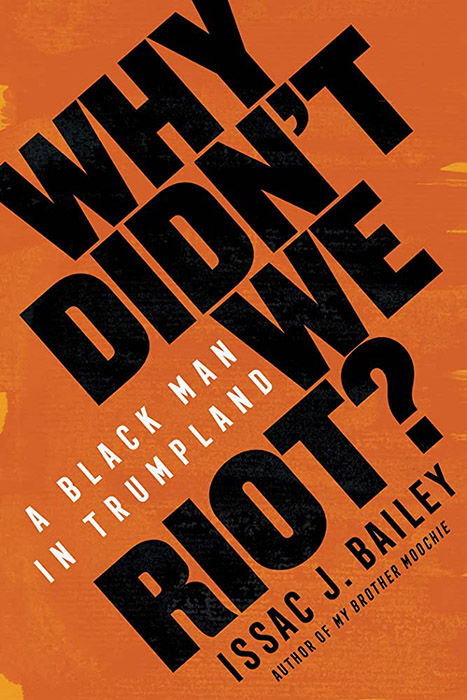Contact Us
Battelle Tompkins , Room 237 on a map
Literature 4400 Massachusetts Avenue NW Washington, DC 20016-8047 United StatesWriter as Witness Colloquium

Professor Issac Bailey’s Why Didn’t We Riot? A Black Man In Trumpland
September 6, 2023
8:00-9:30 PM in Bender Arena
To set the stage for your first year here at AU, we have chosen a book that we call our “community text” for you to read before you arrive in August. You and your classmates will discuss the book and write about it in your College Writing class. The Writing Studies Program and the Campus Store will also sponsor an essay contest to honor writing inspired by the community text. The dialogue we develop around the challenging themes that define our community texts unifies our students and faculty in an intellectual experience. When we ask tough questions, consider what’s at stake for all involved, and listen to one another respectfully, we can develop our own positions and ideas about the world and participate in an academic community. Welcoming our text’s author to discuss their work is an essential part of this shared intellectual experience.
We’re delighted to announce this year’s choice: Professor Issac Bailey’s Why Didn’t We Riot? A Black Man In Trumpland. We will meet with Professor Bailey this fall for the twenty-sixth annual Writer as Witness Colloquium on Wednesday, September 6, from 8-9:30 p.m. in Bender Arena. He will address the American University community and meet with students and faculty to discuss the book, as well as the craft, artistry, and research that went into its creation.
Previous Writer as Witness Texts
- Conditional Citizens: On Belonging in America, by Laila Lalami, long-listed for Andrew Carneigie Medal, and named one of the best books of the year by Time, Bookpage, NPR, and LA Times.
- Eloquent Rage: A Black Feminist Discovers Her Superpower, by Brittney Cooper, named best/most anticipated book of 2018 by The Atlantic, The Root, Politico Magazine, Glamour, and Bustle.
- Rising Out of Hatred: The Awakening of a Former White Nationalist, by Eli Saslow, winner of the 2019 Dayton Literary Peace Prize for Nonfiction.
- The Sixth Extinction: An Unnatural History, by Elizabeth Kolbert, winner of the 2015 Pulitzer Prize in the General Nonfiction Category
- Strangers in Their Own Land: Anger and Mourning on the American Right, by Arlie Russell Hochschild, National Book Award finalist
- We Gon' Be Alright: Notes on Race and Resegregation, by Jeff Chang, the Northern California Nonfiction Book of the Year
- Notes from No Man's Land, by Eula Biss, winner of the Graywolf Press Nonfiction Prize and the National Book Critics Circle Award for Criticism.
- The Good Soldiers, by David Finkel, a "Best Book of the Year" for the New York Times, Chicago Tribune, the Boston Globe, the Christian Science Monitor, and others, and the winner of the Helen Bernstein Book Award for Excellence in Journalism.
- The Devil's Highway: A True Story, by Luis Alberto Urrea, a Pulitzer Prize Finalist and winner of the Lannen Literary Award.
- Savage Inequalities, by Jonathan Kozol, a finalist for the National Book Critics Circle Award.
How Do We Choose the Writer as Witness Book?
We do have some criteria for our Writer as Witness books. They must be non-fiction, and the author must be alive and available. We look for books that relate to current events and issues and that make an argument using research. Most importantly, we want a book that generates discussions about a writer’s rhetorical choices.
The Writer as Witness faculty committee in the Writing Studies Program starts the process in early October by asking for nominations for the book from people across campus, including current College Writing students. They review the books on that list and narrow it down to about ten books. Then they look at those books more closely, along with reviews of the books and any audio or video appearances by the author. The committee members are then able to narrow the list to four or five choices, and they send that list to the director of the Writing Studies Program, usually in December. In fall 2020, we added a student focus group to this process. The program director spends about a month contacting the authors’ agents to find out if they’re available on our Writer as Witness date and how much they cost. (There are many authors whom we just can’t afford.) Once the director comes to an agreement with an agent, they needs to get approval from the university to proceed with the contract, and the contract process can take one to two months. If all goes well, we have next fall’s book chosen and the contract signed by mid-spring.
